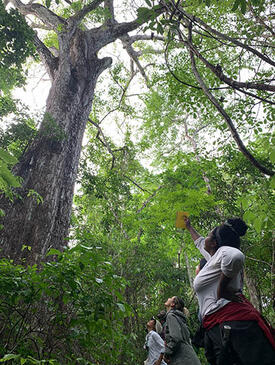Theory and Practice for Engaging Landholders and Communities in Conserving and Restoring Tropical Forest Landscapes
Summary
The tropical dry forest ecosystem of the Neotropics is constantly threated by the pressure of having to sustain human livelihoods, especially from agriculture and livestock use. Specifically in Panama's Azuero Peninsula, deforestation has degraded the provision of ecosystem services. With erratic annual rainfall and a dry season lasting from five to six months, the region’s extreme climate variations compound the stresses of unsustainable land-use practices and make efforts to restore the ecosystem particularly challenging. Advances in forest restoration and agroforestry-based systems have been shown to enhance production and ecosystem services in mosaic agricultural landscapes. Nevertheless, successful implementation of restoration activities requires a clear understanding of not only biophysical approaches but also the socio-economic variables and how they influence land use decision making.
Over a period of six days, master’s students from Eva Garen’s seminar course will learn from ELTI team members and local landholders about the ecology of tropical dry forests, how and why these ecosystems have been modified over time, and the distinct historical, cultural, and socio-economic factors that shape and influence land management practices in the region. Students will also visit a network of field sites that showcase a range of forest restoration and sustainable cattle ranching strategies that landholders are adopting in the region with support from ELTI’s Training and Leadership programs. Particular attention will be given to the social aspects of conserving and restoring this unique forest type, and how and why landowners and community associations facilitate and promote on-farm restoration activities. The course will take place almost entirely in the field, where students will have ample opportunity to talk with farmers and cattle ranchers about their land management challenges and opportunities, and also with ELTI team members about their capacity development strategies and interventions. Students will also interact with government officials who had a role in implementing Panama’s one million hectare Bonn Challenge pledge, much of which has been implemented within complex tropical mosaic landscapes such as the Azuero Peninsula.
This field-based course will be facilitated at ELTI’s Panama Training Landscape, located in the Province of Los Santos, Azuero Peninsula, which convey ecological principles through its interpretative trail network and demonstration sites.
This course will only be offered to YSE students who take Eva Garen’s seminar course in spring 2023.
Content
Day 1: Welcome and orientation to Panama (Panama City)
Day 2: Dry tropical forest ecology and ecosystem services (Los Santos Province)
Day 3: Ecological and social consequences of deforestation and degradation
Day 4: Forest restoration strategies for sustaining livelihoods in agricultural landscapes
Day 5: Community-based farmer organizations and forest restoration
Day 6: Environmental governance and course wrap up (Panama City)


